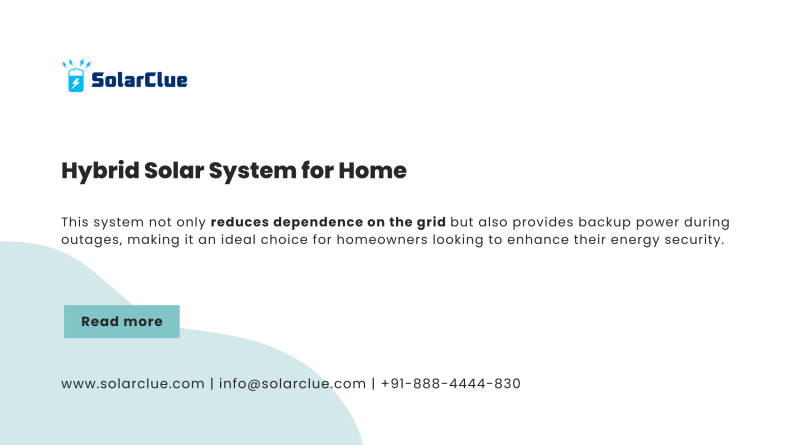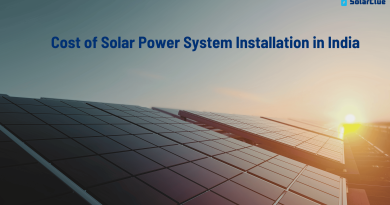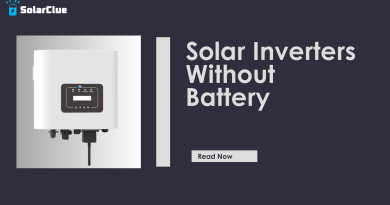Hybrid Solar System for Home
A hybrid solar system is an advanced energy solution that combines the benefits of both grid-tied and off-grid solar systems. It integrates solar panels, a battery storage system, and an inverter, allowing homeowners to generate their electricity, store excess energy, and use it when needed. This system not only reduces dependence on the grid but also provides backup power during outages, making it an ideal choice for homeowners looking to enhance their energy security.
Table of Contents
- 1 Benefits of Using a Hybrid System for Home
Benefits of Using a Hybrid System for Home
The hybrid solar system for home offers numerous advantages, including increased energy efficiency, lower electricity bills, and a more sustainable lifestyle. By storing excess energy produced during the day, homeowners can use it during the night or when the grid is down, ensuring a continuous power supply. Additionally, hybrid systems contribute to a greener environment by reducing reliance on fossil fuels.
In this blog, we’ll explore the components of a hybrid solar system, discuss the advantages of installing such a system in your home, and provide important considerations before installation. We’ll also guide you through the installation process and offer maintenance tips to ensure your system operates efficiently.
Components of a Hybrid Solar System
A. Solar Panels
The solar panels are the heart of any solar system. They capture sunlight and convert it into direct current (DC) electricity. The number and type of solar panels you need will depend on your home’s energy requirements and the amount of sunlight your location receives.
B. Battery Storage System
A crucial feature of the hybrid solar system is its battery storage capability. The battery storage system allows you to store excess energy generated during the day for use at night or during power outages. This ensures that your home remains powered even when solar energy production is low or when the grid is down.
C. Inverter
The inverter in a hybrid solar system converts the DC electricity generated by the solar panels and stored in the batteries into alternating current (AC) electricity, which is used by most household appliances. It also manages the flow of electricity between the solar panels, batteries, and the grid, ensuring optimal energy usage.
Advantages of a Hybrid Solar System
A. Increased Energy Efficiency
A hybrid solar panel system significantly increases energy efficiency by optimizing the use of solar energy and reducing wastage. The system intelligently switches between using solar power, battery power, and grid electricity, depending on the availability and need.
B. Ability to Store Excess Energy for Later Use
One of the primary benefits of a hybrid solar system is its ability to store excess energy. During peak sunlight hours, the system may generate more electricity than your home needs. Instead of feeding this excess energy back to the grid, it’s stored in the battery for later use, such as during nighttime or grid outages.
C. Backup Power During Outages
A hybrid solar power system provides reliable backup power during outages. Unlike traditional grid-tied systems, a hybrid system can continue to power your home even when the grid is down, ensuring that essential appliances and systems remain operational.
IV. Considerations Before Installing a Hybrid Solar System
A. Cost
The initial cost of installing a hybrid solar system for home can be higher than traditional solar systems due to the inclusion of batteries and more advanced inverters. However, the long-term savings on electricity bills and the added benefit of backup power can make it a worthwhile investment.
B. Space Requirements
Installing a hybrid solar PV system requires adequate space for the solar panels, usually on your roof or in an open area with maximum sun exposure. Additionally, you’ll need space for the battery storage system, which is typically installed indoors or in a sheltered outdoor area.
C. Maintenance Needs
While hybrid solar systems are generally low-maintenance, they do require regular checks to ensure optimal performance. This includes cleaning the solar panels, monitoring the battery’s health, and ensuring the inverter is functioning correctly. Regular maintenance can help extend the lifespan of your system and ensure it operates efficiently.
V. How to Install a Hybrid Solar System
A. Hiring a Professional vs. DIY
Installing a hybrid solar system can be complex, especially if you’re not experienced with electrical systems. Hiring a professional ensures that your system is installed correctly and safely, in compliance with local regulations. While DIY installation is possible, it requires significant knowledge and expertise, and mistakes can be costly.
B. Obtaining Permits and Approvals
Before installing a hybrid solar system, you’ll need to obtain the necessary permits and approvals from local authorities. These may include building permits, electrical permits, and approval from your utility company. A professional installer can help navigate this process to ensure your installation is compliant with all regulations.
C. Maintenance Tips for Optimal Performance
To keep your hybrid solar system running efficiently, follow these maintenance tips:
- Regularly clean the solar panels to remove dust and debris.
- Monitor the battery’s performance and ensure it’s charging and discharging correctly.
- Schedule periodic inspections of the inverter and electrical connections.
- Keep the system’s components in a well-ventilated area to prevent overheating.
Conclusion
A hybrid solar system for home offers a powerful combination of solar energy generation, battery storage, and grid connectivity. This system provides increased energy efficiency, backup power during outages, and long-term savings on electricity bills.
Given the numerous benefits and the growing importance of renewable energy, now is the perfect time to consider installing a hybrid solar system in your home. It’s a sustainable choice that not only reduces your environmental impact but also offers financial savings and energy security.
If you have any questions about installing a hybrid solar system or need more information, feel free to contact us. Our team of experts is here to help you make the best decision for your home’s energy needs.
Key Considerations for Installing a Hybrid Solar System
| Consideration | Details |
|---|---|
| Cost | Higher initial investment, but long-term savings on bills |
| Space Requirements | Adequate roof space for solar panels and indoor space for batteries |
| Maintenance | Regular cleaning, monitoring, and inspections required |



